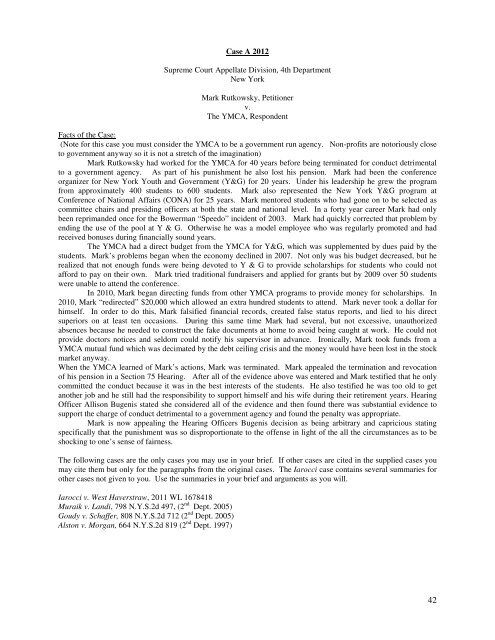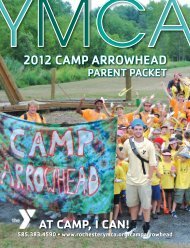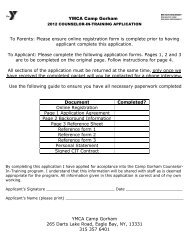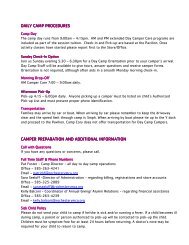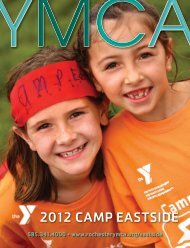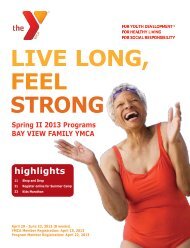2012 Conference Executive Record Report.pdf - YMCA of Greater ...
2012 Conference Executive Record Report.pdf - YMCA of Greater ...
2012 Conference Executive Record Report.pdf - YMCA of Greater ...
Create successful ePaper yourself
Turn your PDF publications into a flip-book with our unique Google optimized e-Paper software.
Case A <strong>2012</strong><br />
Supreme Court Appellate Division, 4th Department<br />
New York<br />
Mark Rutkowsky, Petitioner<br />
v.<br />
The <strong>YMCA</strong>, Respondent<br />
Facts <strong>of</strong> the Case:<br />
(Note for this case you must consider the <strong>YMCA</strong> to be a government run agency. Non-pr<strong>of</strong>its are notoriously close<br />
to government anyway so it is not a stretch <strong>of</strong> the imagination)<br />
Mark Rutkowsky had worked for the <strong>YMCA</strong> for 40 years before being terminated for conduct detrimental<br />
to a government agency. As part <strong>of</strong> his punishment he also lost his pension. Mark had been the conference<br />
organizer for New York Youth and Government (Y&G) for 20 years. Under his leadership he grew the program<br />
from approximately 400 students to 600 students. Mark also represented the New York Y&G program at<br />
<strong>Conference</strong> <strong>of</strong> National Affairs (CONA) for 25 years. Mark mentored students who had gone on to be selected as<br />
committee chairs and presiding <strong>of</strong>ficers at both the state and national level. In a forty year career Mark had only<br />
been reprimanded once for the Bowerman “Speedo” incident <strong>of</strong> 2003. Mark had quickly corrected that problem by<br />
ending the use <strong>of</strong> the pool at Y & G. Otherwise he was a model employee who was regularly promoted and had<br />
received bonuses during financially sound years.<br />
The <strong>YMCA</strong> had a direct budget from the <strong>YMCA</strong> for Y&G, which was supplemented by dues paid by the<br />
students. Mark’s problems began when the economy declined in 2007. Not only was his budget decreased, but he<br />
realized that not enough funds were being devoted to Y & G to provide scholarships for students who could not<br />
afford to pay on their own. Mark tried traditional fundraisers and applied for grants but by 2009 over 50 students<br />
were unable to attend the conference.<br />
In 2010, Mark began directing funds from other <strong>YMCA</strong> programs to provide money for scholarships. In<br />
2010, Mark “redirected” $20,000 which allowed an extra hundred students to attend. Mark never took a dollar for<br />
himself. In order to do this, Mark falsified financial records, created false status reports, and lied to his direct<br />
superiors on at least ten occasions. During this same time Mark had several, but not excessive, unauthorized<br />
absences because he needed to construct the fake documents at home to avoid being caught at work. He could not<br />
provide doctors notices and seldom could notify his supervisor in advance. Ironically, Mark took funds from a<br />
<strong>YMCA</strong> mutual fund which was decimated by the debt ceiling crisis and the money would have been lost in the stock<br />
market anyway.<br />
When the <strong>YMCA</strong> learned <strong>of</strong> Mark’s actions, Mark was terminated. Mark appealed the termination and revocation<br />
<strong>of</strong> his pension in a Section 75 Hearing. After all <strong>of</strong> the evidence above was entered and Mark testified that he only<br />
committed the conduct because it was in the best interests <strong>of</strong> the students. He also testified he was too old to get<br />
another job and he still had the responsibility to support himself and his wife during their retirement years. Hearing<br />
Officer Allison Bugenis stated she considered all <strong>of</strong> the evidence and then found there was substantial evidence to<br />
support the charge <strong>of</strong> conduct detrimental to a government agency and found the penalty was appropriate.<br />
Mark is now appealing the Hearing Officers Bugenis decision as being arbitrary and capricious stating<br />
specifically that the punishment was so disproportionate to the <strong>of</strong>fense in light <strong>of</strong> the all the circumstances as to be<br />
shocking to one’s sense <strong>of</strong> fairness.<br />
The following cases are the only cases you may use in your brief. If other cases are cited in the supplied cases you<br />
may cite them but only for the paragraphs from the original cases. The Iarocci case contains several summaries for<br />
other cases not given to you. Use the summaries in your brief and arguments as you will.<br />
Iarocci v. West Haverstraw, 2011 WL 1678418<br />
Muraik v. Landi, 798 N.Y.S.2d 497, (2 nd Dept. 2005)<br />
Goudy v. Schaffer, 808 N.Y.S.2d 712 (2 nd Dept. 2005)<br />
Alston v. Morgan, 664 N.Y.S.2d 819 (2 nd Dept. 1997)<br />
42


